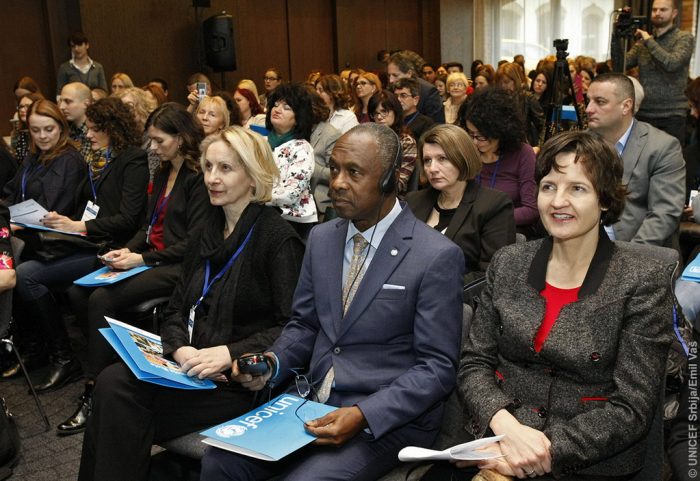 The two-day conference for discussions on the prevention of the drop-out of students from the educational system of the Republic of Serbia, part of the project bearing the same title, started on 28 November in Belgrade.
The two-day conference for discussions on the prevention of the drop-out of students from the educational system of the Republic of Serbia, part of the project bearing the same title, started on 28 November in Belgrade.
The goal of the project, implemented by the Centre for Educational Policy in cooperation with the Ministry of Education, Science and Technological Development and UNICEF, with the financial support of the Swiss Agency for Development and Cooperation (SDC) and the UNIQLO Company, is to contribute to the reduction of the drop-out rate among children and youth through efficient prevention and intervention at the school level, as well as the development of national guidelines for systemic solutions to this issue.
Data obtained during the implementation of the project indicates that all 10 schools that participated in piloting this framework achieved significant results, and the drop-out rate was reduced by 66.1%. Among all the measures implemented by schools, the most effective were proven to be individualized support measures for students at risk of drop-out. Schools can also act preventively on factors usually believed to be outside its reach – very severe poverty, severe family issues and severe behavioural issues.
The conference was opened by Anamarija Viček, State Secretary at the Ministry of Education, Science and Technological Development of the Republic of Serbia, UNICEF Director in Serbia Michel Saint-Lot, and the Director of the Swiss Office for Cooperation in Serbia Ursula Läubli.
The UNIQLO Company and the Swiss Agency for Development and Cooperation provided financial support for initiating the piloting of projects in 7 local self-governments in Surdulica, Vladičin Han, Vrbas, Bela Palanka, Kraljevo, Kragujevac, and Pančevo. Ten schools were selected through a public call, assessed based on criteria including socio-economic development of the local self-government to be the communities with the greatest number of students at risk of drop-out.
“The Swiss Agency for Development and Cooperation has been supporting social inclusion in education for more than 10 years through the Joint Programme for the Inclusion of Roma and Marginalized Children in Education. We have invested over EUR 120 million. Through these pilot programmes, tested through Swiss support, we have seen the quality of schools increase. This motivates children to stay in school and improve their skills, which in turn has a positive impact on their future. These pilot programmes can now start being applied. Inclusive education stimulates an inclusive society and inclusive growth for Serbia”, noted Ursula Läubli, Director of the Swiss Office for Cooperation in Serbia.
Source: www.unicef.rs
 Government of the Republic of Serbia
Government of the Republic of Serbia















 pdf [271 KB]
pdf [271 KB]
Leave a Comment